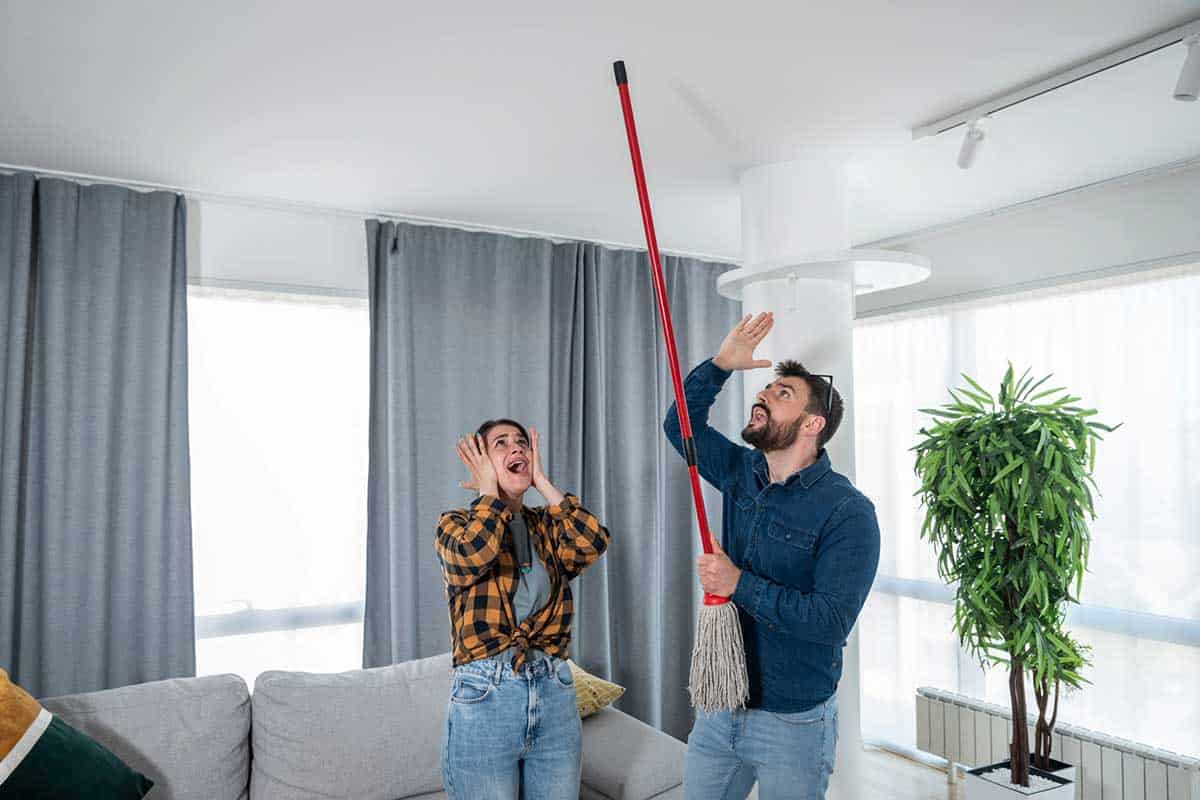This page may contain affiliate links. If you click and buy, we might get a small commission at no cost to you.
If your upstairs neighbor won’t stop stomping, it can turn your home into a source of constant frustration. While shared living comes with some noise, frequent heavy footsteps, especially late at night or early in the morning, can disrupt your peace. Whether the stomping is accidental or inconsiderate, there are steps you can take to address it. This article covers how to approach the problem calmly, reduce the noise on your end, and know when it’s time to escalate the issue.
Article highlights
- Start with polite communication; many neighbors don’t realize they’re being loud.
- If the noise continues, document it and involve your landlord or property manager.
- Use simple soundproofing tricks to reduce impact noise in your own space.
What to do if your upstairs neighbor is stomping
1. Start with a polite conversation
Approaching your neighbor directly, politely and in person, is usually the best first step. Many people don’t realize how much noise they’re making. Floors can amplify even normal footsteps, especially in older buildings with minimal insulation.
In-person contact is preferable to written notes because it allows you to control your tone and body language. Even a well-written note can come across as passive-aggressive or cold. A calm face-to-face chat shows you’re trying to resolve the problem, not start a confrontation. Timing matters. Don’t knock on their door when you’re angry. Approach them during the day, and keep things light: “Hey, I know apartment living isn’t always silent, but I’ve been hearing a lot of loud footsteps lately and was wondering if we could work something out.”
2. Give helpful suggestions if they seem receptive
If your neighbor is understanding, they may be open to easy fixes. Offer practical ideas like wearing socks or soft slippers indoors instead of shoes. If the noise tends to happen during specific hours, consider asking if they’d be willing to agree on “quiet hours” that work for both of you.
Sometimes people want to help but don’t know how. You could even recommend affordable rugs or felt pads for their furniture. If you’re on good terms, consider sharing a link to an Amazon product like rug grippers or furniture pads to help reduce impact noise.
3. Follow up with a written note
If you’re unable to speak with your neighbor directly or the noise continues after your conversation, a written note is your next step. Keep it polite and specific. Mention the time of day the stomping usually happens, how it’s affecting you, and ask if they’d be willing to help.
Even if you’re extremely nice, written notes can sometimes be taken the wrong way. That’s why it’s best used after an initial conversation or if in-person contact just isn’t possible. It also helps create a paper trail in case you need to involve management later on.
4. Use soundproofing strategies in your own apartment
While you can’t stop the stomping entirely, you can reduce how much of it reaches your ears. Add soft materials like rugs, heavy curtains, and wall hangings to absorb sound. Consider using a white noise machine like the Yogasleep Dohm to help drown out thudding footsteps during sleep hours.
Strategically placing furniture or moving your bed away from the noisiest areas of the ceiling can also help reduce how much the stomping bothers you. Even small changes in layout can make a difference in noise levels.
5. Keep a noise log
If the problem persists, start logging the disturbances. Include the date, time, and nature of the noise (e.g., “loud stomping from 10:15–10:45 p.m.”). Also note how it affects your day… whether it interrupted sleep, work, or relaxation.
This log will be useful if you need to bring the issue to your landlord or property manager. It shows that your complaints are consistent and justified, not just occasional annoyance.
6. Contact your landlord or property manager
If polite communication doesn’t work, it’s time to involve your landlord or building management. Share your noise log, describe what steps you’ve already taken, and let them know the issue hasn’t improved.
Most rental agreements include a clause about quiet enjoyment. Management may issue a formal warning to your neighbor or step in with suggestions like area rugs or noise-reducing furniture pads. If the building has set quiet hours, they may be able to enforce them more strictly.
7. Know your legal options if it escalates
If all else fails and the noise continues at unreasonable hours, look into your local noise ordinances or tenant rights. In many cities, repeated noise violations, especially during quiet hours, are enforceable under the law.
Reach out to a local tenants’ rights group or housing authority if you’re unsure of your options. In extreme cases, you may be able to terminate your lease without penalty if the noise is severe and your landlord fails to act.
Why upstairs neighbors stomp
Stomping from upstairs neighbors can come from a variety of causes—none of which may be intentional. Kids playing, people walking in hard shoes, exercising, or even furniture being moved can all create loud impact sounds through the floor. In many buildings, especially older ones, the materials used between floors simply don’t do much to dampen noise.
While it’s tempting to assume the worst, understanding that the noise may not be malicious can help you stay calm and approach the situation more constructively.
What to do if your neighbor is rude or aggressive
If your neighbor becomes rude, dismissive, or even threatening when you bring up the noise, end the interaction immediately. Do not engage further. Your safety comes first. Make a note of the encounter and inform your landlord or property manager.
If you feel unsafe at any point, contact local authorities through a non-emergency line and report the issue. Serious or repeated aggression may also be grounds for legal action, especially if harassment or intimidation is involved.
Know your rights as a tenant
Tenants have the legal right to live in peace. If your landlord refuses to address ongoing noise complaints, review your lease agreement and research local tenant protection laws. Many cities have specific rules about quiet hours, noise limits, and tenant responsibilities.
In some cases, you may be able to withhold rent, break your lease without penalty, or take legal action… especially if you’ve made a good-faith effort to resolve the issue and your landlord fails to act.
Conclusion
When your upstairs neighbor won’t stop stomping, it can feel like an impossible situation, but you have options. Start with a calm, respectful conversation. If that doesn’t work, follow up with a note, involve your landlord, and take steps to reduce the noise on your end. Document everything in case you need to escalate.
And if all else fails, you could always buy the apartment above you and terminate their lease (just kidding… unless?).



